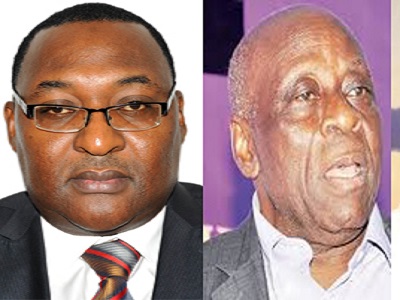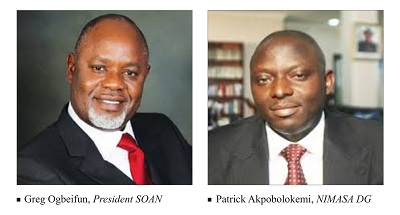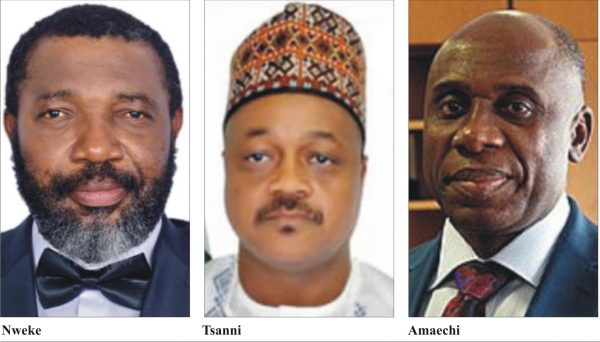2019 Transport Agencies Rating: How NIMASA, NCAA, AIB Fared

By Kenneth Jukpor & Okuneye Moyosola
MMS Plus presents the scorecard of more transport sector agencies based on their performance in the first half of 2018 with regards to their core functions. In this week’s appraisal, we x-ray; Nigerian Maritime Administration and Safety Agency (NIMASA), Nigerian Civil Aviation Authority (NCAA) and the Accident Investigation Bureau (AIB).
For the grading system: A =90-100%, B+ = 80-89%, B =70-79%, C+ =60-69%, C =50-59%, D =40-49% and E = 30-39%, F = 0-30%. Enjoy it:
Nigerian Maritime Administration and Safety Agency (NIMASA)
NIMASA is saddled with the onus of maritime administration and safety; to pursue the development of shipping and regulatory matters relating to merchant shipping and seafaring.
We would rate NIMASA’s scorecard for 2019 against its core functions unbundled into ten (10) parts:
Administration and regulation of shipping licences:
NIMASA took delivery of the findings and recommendations by a committee set-up to revamp its ship registry and swiftly reconstituted a committee to implement the findings. The committee headed by Engr. Emmanuel Ilori. There was an improvement in wholly owned Nigerian vessels from 234 to 291 in 2019, even as Ilori says the gains in this area would come to the fore soonest. According to the NIMASA Director General, Dr. Dakuku Peterside, it takes 14-30days to successfully register a vessel if all documents are made available speedily. He also said twenty world class vessels flagged Nigeria in 2019. Nevertheless, operators insist it takes more than six months to register a vessel.
Score = 5/10
Administration, Regulation and Certification of Seafarers:
NIMASA says it placed 7414 seafarers onboard vessels trading on Nigerian waters. If these figures as well as the reported 413 placed onboard vessels for seatime are correct, indeed there was a spike in the development of seafarers in the country. However, some shipping experts have queried these figures with complaints that indigenous ship owners do not have the capacity to absorb such seafarers.
Score = 3/10
Establishment of Maritime Training and Safety Standards/ Regulation of safety of shipping as regards the construction of ships and navigation:
Since ship building is relatively an unexploited area, there are no indices to be measured in this area.
Score = 0/10
Maritime Search and Rescue Services and providing direction to ensure compliance with vessels security measures:
Search and rescue operations in the country slightly improved in 2019 as NIMASA built relationship with other stakeholders such as the Nigerian Navy. However, some ship owners have unpleasant experiences with reports that the agency failed to come to their rescue when ships were in distress.
Score = 4/10
Provide Maritime Security:
Despite NIMASA’s ongoing security architecture tagged Deep Blue Project the problem of piracy and maritime insecurity persists. The menace heightened in the last quarter of 2019 with vessels attacks as the Nave Constellation was the biggest with nineteen crewmembers kidnapped before they were released weeks later. There are plans to complete the acquisition of all security equipment to combat the menace in 2020. Stakeholders have also admonished NIMASA to prioritize the implementation of the recommendations from the Global conference on the Gulf of Guinea (GoG) organized by NIMASA last year.
Score = 3/10
Enhance and administer the provision of Cabotage Act 2003/ Control and prevent Maritime Pollution:
NIMASA has nothing in the first to change the status-quo. Nothing significant was recorded in the area of maritime pollution. However, the Director General of NIMASA, Dr. Dakuku seems ready to correct the trend in 2020 as he recently said that the agency would ensure compliance to the new IMO low sulphur fuel regulation.
Score = 3/10
Develop and implement policies and programs, which will facilitate the growth of local capacity in ownership, manning and construction of ships and other maritime infrastructure:
The 5-year waiver cessation plan has taken effect and NIMASA says it has engaged all stakeholders to be involved in ship building. However, in 2019 there were no publicized programmes to improve local capacity ownership, manning, construction, among others.
Score = 2/10
Perform Port and Flag State duties:
In 2019, according to the Abuja MoU, the regional Port State Control group in West and Central Africa, Nigeria emerged number one in Africa in terms of port state control. NIMASA boarded over 600 vessels in year under review and this was the highest in Africa. There was 13% deficiency rate as well as a significant drop in number accidents. This development fetched NIMASA commendation from the International Maritime Organization (IMO) and the Abuja MOU.
Score = 8/10
IMO Conventions:
NIMASA reached a level where they received IMO commendations for following its conventions especially in compliance to ISPS code as well as port state and flag state control.
Score = 7/10.
Carry out Air and Coastal Surveillance:
NIMASA can see 200 nautical miles off Nigerian coastal waters. NIMASA also performed well in this aspect as a result of the collaboration between the agency, the Nigerian Navy and the Nigerian Airforce in 2019. The agency is expected to fare better in 2020 with the acquisition of more surveillance equipment.
Score = 6/10
Conclusion:
With the slow pace of the nation’s budget approval, NIMASA can argue that the required funds weren’t available to tackle some core functions; however, there are several areas yearning for attention. The Deep Blue Project is one that could transform the scorecard of the agency significantly and the shipping community should expect more from the agency in 2020.
Grade D (41%)
Nigerian Civil Aviation Authority (NCAA)
Nigerian Civil Aviation Authority is the regulatory body for aviation in Nigeria. The Authority regulates Aviation Safety without political interference, and also to carry out oversight functions of Airports, Airspace, Meteorological Services, as well as economic regulations of the industry.
NCAA’s core functions would be unbundled into 5 parts, each carries 20 points:
Regulation of safety of aircraft operations, air navigation and aerodrome operations
NCAA and the Nigerian Communications Commission (NCC), partnered to ensure proper regulation to sustain the use of drone and the appropriate spectrum to be deployed for service. NCC said the Unmanned Aircraft Vehicle (UAV) technology, otherwise known as the drone, has gone through substantial development in recent years and its market has shown exponential growth, similar to other new technologies. In a bid to improve the safety of aircraft operations, the NCAA also barred Apple Macbook Pro from all flights. The NCAA said several risks were associated with the computer as it could cause overheating which could be dangerous for the flight.
Score: 11/20
Monitoring of aircraft operating environment for safety and security
In a bid to ensure safe flight operations in Nigeria airspace, the Nigerian Civil Aviation Authority (NCAA) issued Advisory Circular to intimate pilots, operators and other stakeholders about dust haze (harmattan) and safety approach to adopt during the year 2019.
The NCAA also certified new aviation security instructors for Bi-Courtney Aviation Services Limited, the operator of the Murtala Muhammed Airport Terminal 2, Lagos. The certification was part of a larger plan designed to further entrench safety and security awareness and the provision of improved services at the terminal.
Score: 9/20
Regulating of methods of entry and conduct of air transport business
The Nigerian Civil Aviation Authority [NCAA], in the second half of the year, reiterated its threat to wield the big stick over charter operations by unauthorized permit holders. With this, any operator caught engaging in any unauthorized services will have its Air Operator Certificate [AOC] suspended or revoked. This is in line with the NCAA statutory responsibilities of regulating the conduct of air transport business.
Score: 8/20
Balancing the economic interest of operators, users of aviation services as well as the general public and the nation as a whole
NCAA introduced automation to prevent accumulation of debt for airlines. Mr Samuel Adurogboye, General Manager, Public Relations, NCAA had disclosed that airlines indebtedness to the authority was more than N10 billion. This is a good move in ensuring that airlines in the country are sustainable.
Score: 7/20
Setting of Aviation Training Standards and approval of Training Institutions
No achievement was recorded by the authority under this area in the period under review.
Score: 5/20
Conclusion:
In the second half of the year, President Muhammadu Buhari approved the appointment of Captain Musa Nuhu as the new Director General of the Nigerian Civil Aviation Authority (NCAA). Although not much activities were done by the authority in the second half of the year, much is expected NCAA as the regulator in the year 2020.
Stakeholders, in the second half of the year also tasked NCAA to review the conditions for the establishment of airlines as a result of short lifespan of many airlines in Nigeria with over 50 airlines going under. NCAA should pay attention in addressing this issue this year.
Grade D: 40%
Accident Investigation Bureau (AIB)
The Nigerian Accident Investigation Bureau (AIB) is charged with the responsibility of investigating any civil aircraft accident and serious incident arising out of, or in the course of air navigation and occurring either in or over Nigeria, or occurring to Nigerian aircraft elsewhere.
AIB made further trailblazing strides in achieving its organizational objective to become the bastion and reference point of excellence in air accident investigation in Africa.
AIB and the Bureau d’Enquêtes et d’Analyses pour la Sécurité de l’Aviation Civile (BEA) France, signed an Executive Technical Cooperation Programme geared towards fostering mutual cooperation between both countries in respect of air accident investigation and capacity building. In the first half of the year
In the second half of the year, AIB released three preliminary reports on serious incidents involving Air Peace.
The preliminary reports are not the final reports as they contain details of the initial facts, discussions and findings surrounding the occurrences; which include information gathered from witness statements, flight recorders, Health and Usage Monitoring System (HUMS) Data, Flight Data Monitoring (FDM) data, and preliminary inspection of the accident sites and the wreckages.
The reports released by AIB included the serious incident involving Air Peace Limited B737-300 aircraft with nationality and registration marks 5N-BUK at the Murtala Muhammed International Airport, Lagos on May 15, 2019.
AIB also released the report on the serious incident involving the airline’s B737-500 aircraft with nationality and registration marks 5N-BRN at Port Harcourt International Airport, Port Harcourt on June 22, 2019.
Also released is the report on the serious incident involving Air Peace Limited B737-300 aircraft with nationality and registration marks 5N-BQO at the Murtala Muhammed International Airport, Lagos on July 23, 2019.
The Bureau also released six final accident and serious incident reports that occurred in Nigeria aviation industry between 2012 and 2018. It also issued 24 safety recommendations that can prevent future accidents and serious incidents in 2019.
AIB scores 46/100
Grade D (46%)
Expect ratings of other transport agencies next week!







